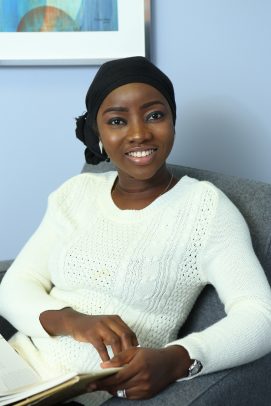Inspiring graduates: Khadijat George

Khadijat George grew up in a rough neighborhood in Nigeria. “I wanted a good life. But most of all I wanted to make a difference,’” she says. (Photo: Jenny Fontaine)
Khadijat George grew up in a rough neighborhood in Mushin, Lagos, a part of Nigeria where violence is pervasive.
“Anyone who has heard of Mushin knows how often riots happen there — street fights almost all the time,” said George, a senior in rehabilitation sciences. “They aren’t very good memories for me, but the problem was that my parents were poor and that was what they could afford.
“But I always knew I wanted to be more than just a ‘ghetto girl.’ I wanted a good life, family, friends, education, financial security. But most of all I wanted to make a difference.”
George’s father wanted to be a lawyer, but his family could not afford to send him to school. But he wanted his kids to be educated, so he filled their home with books.
“I guess what changed my perspective was that I grew with these books,” she said. “My dad would always ask what I had read and learned. I started to think differently — that I wanted to be different from the environment I was in.”
And then, George’s family caught a lucky break. Her father played the lottery and won, and in 2013, he was able to bring George and her sister to the United States.
After settling in Chicago, George began taking classes at Truman College, then transferred to UIC in fall 2016.
Around the time George began her studies at UIC, her father moved to Texas, so she had to work as many as three jobs at once to pay for school, housing and other bills.
Her work schedule has posed some challenges. She works full time on the overnight shift at Presence Saint Joseph Hospital in the Lakeview neighborhood as a patient care technician. It’s been tough working at night, then sometimes heading straight to class.
“It was very hard, she said. “But it has prepared me for the challenges in the near future.”
George plans to work full time for the next year, then apply to graduate school. She recently married in Nigeria and her husband, Adenrele Oke, will join her in the U.S. next year. Together, they will decide whether to stay in Chicago or relocate for a graduate program.
George aspires to become an occupational therapist and someday use her skills to help advance health care in her home country of Nigeria.
“If someone has been shot and now feels like they are useless, maybe we can show them what they still can do,” she said. “And some people in Nigeria still hide their kids who have disabilities, which is horrible. I want to help make changes in how disability is perceived. The culture is different, so it’s not going to be an easy thing, but it has to start somewhere, with someone.”
